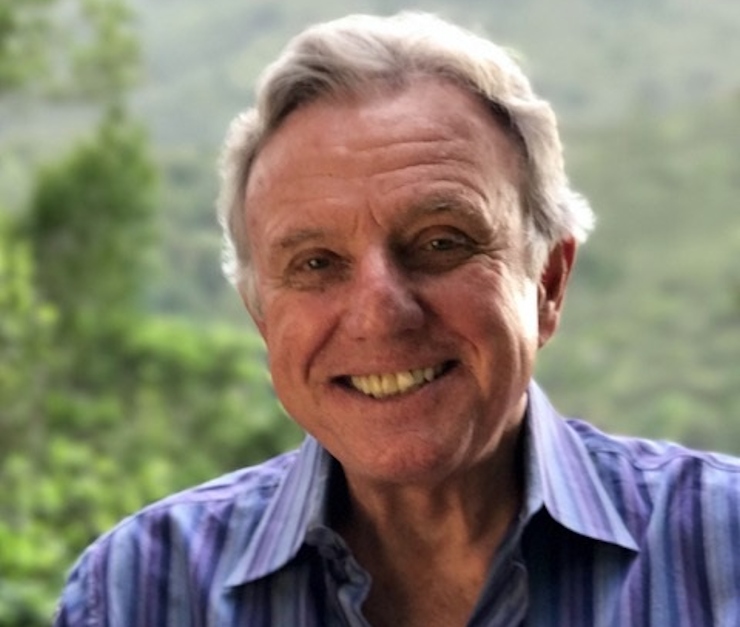
When a TV camera crew shows up, it attracts attention. What’s going on, we wondered, when we saw the press and Wilford Welch on the gangway to his 1 East Pier home last month. It turns out, he was being interviewed by a German TV station about solutions to global warming.
Getting us to change course on climate is Wilford’s passion. His book, In Our Hands: A Handbook for Inter-generational Actions to Solve the Climate Crisis, is a call to arms. But one with solutions. Nobel Peace Prize Laureate Desmond Tutu says, “In this book, Wilford shows us the way.”
Wilford has circled the world many times, first as a U.S. diplomat to Asian countries, then as a management consultant helping spur global economic development. A research team that he led developed the Wealth of Nations Index. For a decade, he published a global newspaper called The World Paper. He was in touch with the natural world too. As a mountaineer, he witnessed the problems we humans create when we overload the environment. He helped remove 5,000 pounds of trash from Mount Everest and introduced the Leave No Trace practice there. Wilford was chair of the National Outdoor Leadership School (NOLS), the world leader in teaching wilderness skills, and chair of the NatureBridge Golden Gate campus in the Marin Headlands which provides environmental education to 11,000 kids each year.
The existential seriousness of our climate problem hit him when he saw the destruction in Ethiopia’s Omo Valley first-hand. “What I saw going on there was a microcosm of the larger world,” if we continue on our current trajectory. “Overpopulation, global warming, and governments seeking economic growth at all costs—even to their own people and the natural world.”
“The Omo Valley is the birthplace of humanity. The Hamar people had been there hundreds of thousands of years. They were taken off their land, the land fenced, water taken from the river to irrigate, then the land was leased to the Saudis, Turks and Chinese. They marginalized their own people. But the GNP of the country went up.”
This experience, 10 years ago, prompted Wilford’s research and activism. “This crisis is more serious than people think,” he says, pointing to data from the Yale Program on Climate Change Communication. 21% of Americans are alarmed by the effects of climate change and are taking action. Another 30% are concerned, but not acting on that concern. “We don’t have a government that’s taking this problem seriously, but also individuals aren’t rising and waking up fast enough.”
I wondered if, for individuals, it’s because it feels so overwhelming. What difference can an average citizen make? “It’s not that complicated,” Wilford assures me. “It doesn’t even take much time. It takes focus.” Just be aware of your day-to-day activities that affect the climate and do your part. It can mean voting for candidates who seriously address climate change, switching to LED lighting, or eating less meat. Even talking with others about it can help. There’s a solutions fact sheet on his website.
Wilford’s easily accessible, 100-page book takes a systems approach to solutions and imagines a probable and possible future depending on action we take, or not, before 2050. There’s a Resources for Learning and Action section too. It’s a useful tool for group discussions and classes.
Fossil fuel use has made life comfortable and convenient, but the unintended consequences to the planet are going to kill generations unless we make the necessary changes. “I want to be reminded who’s in charge,” Wilford says. “Mother Earth.” It’s one of the reasons he lives in our community. The FHA community too is being affected by climate change, primarily sea-level rise. The German TV journalist wanted to know what we’re doing to deal with it.
Wilford told them we’re taking measurements of the height of King tides—collecting data. You may have noticed the measuring sticks on the docks. Global warming is contributing to the California fires. PG&E says to plan for 4 days without electricity. In response, the FHA Board is considering creating our own backup systems of wind or solar. Waldo Point Harbor raised the sea wall 4-5 feet. Without it, that area would be flooded. But in the future, Highway 101 North will be flooded. That too must be addressed.
You can hear Wilford talk about climate change solutions in general and in our community when his interview airs in August. You’ll be able to see it from his website. You can also contact him from his site.
“We’re not victims,” Wilford tells his audiences. “We have a choice about how this story ends.”